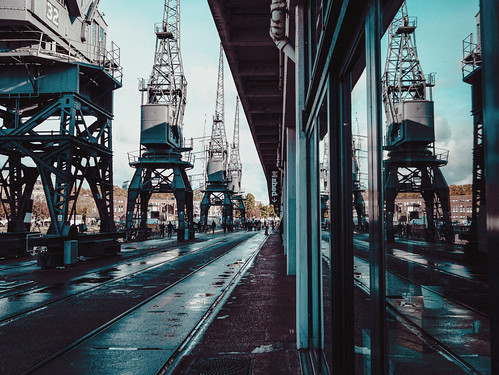I’ve been thinking about how so many stories touch on the idea that another life or even world is almost perceivable but impossibly far away, under normal conditions, but the heroine can see different versions of the future or choose different paths, etc. Or the whole ‘sliding doors’ thing, where a critical moment splits a life in two. Those stories are delicious, not just because we get to explore versions of what might have happened, but because they satisfy a deeper intuition that our sister-lives are almost touchable. (I will only ever recommend Jo Walton’s ‘My Real Children’ as the best, most profoundly compassionate and practically wise branched narrative any of us is likely to encounter.)
When my husband Ed was deployed to Afghanistan, I wrote him letter after letter, not quite able to believe that the blue envelope could exist both in a military quarter in Scotland and, soon after, a base in Helmand. (Letters! The original time travel machine, and the best.) Or that he might have walked out the door five months before for what we couldn’t yet know was be the last time. (It wasn’t.) We often spin contingency around tragic or life-altering events, the ‘if only’s’ about humdrum decisions that set in train outcomes we so desperately wish hadn’t happened, and whose precipitating actions seem so trivial, so mundane, there must surely be a way to take them back. Even stuff like taking the stairs and not the lift at the airport, and just missing that flight. You feel like you can almost reach back and grab yourself of just a few minutes ago.
When I was a university student, my father was involved in a serious car accident. At home looking after my younger siblings, I heard his deeply familiar footsteps come down the hall. In the moment the door handle turned, I both knew it must be him and that it couldn’t be. Both seemed equally true, and until the person came into the room, my father was just as much walking into the kitchen as he was lying in an ICU. (The steps were my older brother Henry’s. I just hadn’t realised they then had the same gait and also source of shoes, i.e. my mother…)
Of course, a lifetime of reading Borges and SFF and popular science about quantum physics is inevitably going to create a fractally abundant way of thinking and feeling about what is only ever plain old contingency. Or just provide more metaphors that dissolve on contact with the inability to express how weird it is that time moves inexorably forward when we, surely, can just. not. Or could sidestep it beautifully in defiance of the expected rhythms, if we, too, had Dune’s choreographer Benjamin Millepied (he of Black Swan/Natalie Portman fame) teaching us how to move.
(By the by, I’ve not seen anything about how very, very French the sensibilities of that film are, from its director to its male lead to Charlotte Rampling’s perfectly ‘learning nothing and forgetting nothing’ Bene Gesserit abbess, to its very slightly orthogonal aesthetic relation to imperialism in the Arab world. Also the music, though I may be wrong about that.)
Anyway, I was just wondering if other people have that ‘can almost reach out and touch it’ feeling about branched lives, or other forms of intuitive disbelief about continuity, causality and contingency, or perhaps I’m calling it the wrong name entirely. How one moment leading straight to the next, and one thing inexorably causing another just seems unlikely, at very large and very small scales. I’m not entirely convinced about the middle one, either.
Does this mode of appeal to other possibilities predate late twentieth century literature and physics, or do we just use new models and metaphors to describe something people have always felt? Or was there – oh no! – a complete fracture in how we conceive of this, or perhaps just the mental model of how we make peace with it, and now there’s no going back? Perhaps what I’m calling contingency, which seems also to contain the idea of its own unsteadiness, is just a secular form of disbelief in the primacy of the present. Was it always thus?






